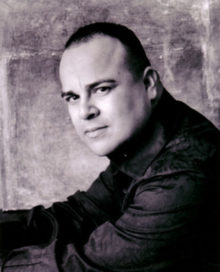 Butterfly Boy: Memories of a Chicano Mariposa
Butterfly Boy: Memories of a Chicano Mariposa
by Rigoberto González
Published by University of Wisconsin Press
Writing in Latinidad series:
Autobiographical Voices of U.S. Latinos/as
Published September 2, 2011
History (autobiography)
224 pgs. • Find on Amazon.com • WorldCat
Reviewed by Stephen O. Murray
January 30, 2007
Also see Dr. Murray’s review of What Drowns the Flowers in Your Mouth, published in 2018
Writing about his 20-year-old dazed and confused self and the flashbacks of that person’s tough growing up, Rigoberto González in his mid-30s wrote Butterfly Boy, a compelling memoir in very assured novelistic style.
“Mariposa” is the Spanish word for butterfly. It is also the most polite euphemism for an “effeminate” and presumably homosexual male (like nieh zhu in Mandarin, fragility is the salient part of the metaphor, though colorfulness/flamboyance is also connoted). Also monarch butterflies winter in huge numbers in the Mexican state of Michoacán, where the author’s family came from. It is also the state that has traditionally supplied the most seasonal farmworkers to the American Southwest. Rigoberto and his grandfather were born in the United States, both his parents were born in Michoacán, and the movement back and forth is central to the construction of the memoir.
At the start, after completing his freshman year at the University of California, Riverside, the 20-year-old narrator (henceforth R) is leaving an older (40ish) man whose “lovemaking” is very rough and includes inscribing butterflies on the student’s back. R is setting out to travel by bus (three or four days by second-class bus) back to Zacapu, Michoacán.
On the long bus trip (with two breakdowns), R’s resentments for the father who abandoned him and his brother (remarrying and starting another family) and whom he believes (seemingly with good reason) drove G’s mother to an early death (at the age of 31) seethes and occasionally bubbles over despite R’s resolve not to fight en route. That the other riders find his father convivial and a good story-teller does not soothe R at all. To the contrary, it greatly annoys him that others like his father. And R has heard all the stories more than once before.
R’s own story (chronologically arranged in extended flashbacks) centers on being orphaned (de facto) at eleven with the death of R’s mother. His younger brother was his father’s son, R was his mother’s son, but both were taken back from Zacapu (where she had gone to die) and then abandoned to relatives in Indio, California (inland in southern California).

R experienced acute hunger and overate when he could. Along with the late onset of puberty (in particular, the lowering of his voice), his lack of interest in sports and his pudginess led to him being called “fat fag.” That he was left-handed was another deviance that was not accepted. And he was very myopic, not getting glasses until junior high school.
Like many an adolescent male bewildered by what he knew were illicit interests (especially sexual interest in male bodies), R threw himself into the alternative worlds opened by reading, and he excelled at school even with the disruptions of going to schools in Mexico and in California and “keeping to myself at such alarming extremes that I became invisible” even to the fag-baiting bullies.
He was the first member of his family to graduate from high school, let alone from college, and overcame various culture shocks and the lack of cultural capital the middle-class students brought to college.
The memoir is much more about poverty and class differences than it is about sexual orientation, though being homosexual and accustomed to mistreatment does not creep up: it is up front in the first chapter. And before the abusive relationship in Riverside, R had many experiences of providing a sexual outlet to macho Mexicans and Chicanos in Mexico and in southern California.
R’s mother tried to masculinize him. His father did not call him names or beat him for being insufficiently masculine, and at one point seemed to be trying to articulate acceptance. But the general cultural principle is “hecho todos, dicho nada” (do whatever, but say nothing), and G’s aunt who glimpses him under a neighbor exemplifies what I call “the will not to know.”
“I sought out clandestine affairs of my own, which wasn’t hard in a Mexican community,” G recalled in the “Indio, 1983–88” chapter.
Men satisfy their [sexual] urges secretly, confident that their public sexuality [and masculine deportment] displaces any suspicion or speculation about their private one…. I had flings with married men or men with girlfriends, with men who had children, sometimes as old as I was…. They were machos. I was their own personal Liberace who whispered tunes in their ears they would never admit to having heard. It didn’t matter that I was fat or thin, just available. (151–52)
So little was said that “for the longest time, I doubted that I was gay myself because this identity was never talked about by any of us or even recognized in the secrecy of the dark bedrooms.” G was hungering for attention, for being courted and overpowered (taken), however clandestinely.
Although I am quite willing to believe that what is in the book is how the 20-year-old future author felt and fairly willing to accept that his past was how he recalled it then, the dialogue (there is a lot of it) clearly was written rather than recalled verbatim. The chronologically forward flow of memories is also not how we remember things from our past. The construction, including the provision of dialogue is “novelistic”—and that of a skilled novelist, at that—but I do not question that Butterfly Boy is a memoir. It is a memoir of where Rigoberto González, who is now a college professor and the author of five previous books, came from—with keen specificity about geography and poverty.
© 30 January 2007, Stephen O. Murray

